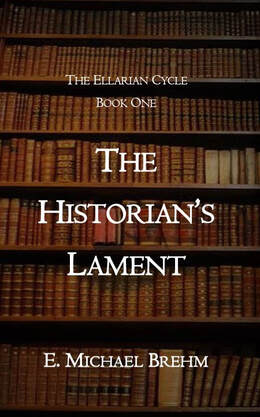 Available on Amazon, if you're curious. Available on Amazon, if you're curious. One of the long-term joys in my life is writing. Whether it’s this blog, long-winded emails to colleagues (sorry, colleagues), letters to friends, or any other form, I have always found a certain measure of satisfaction in putting words upon a page. Most recently, that joy has found expression in The Historian’s Lament, a book I released earlier this month. The Historian’s Lament was not the book I expected to write. I flirted with a number of genres in my life before settling on Fantasy, but was already writing a trilogy. I had self-published the first book and was working diligently on the second, and I felt as though I had enough to say that I should be able to move on to the third in relatively short order. Then, on Tuesday, November 8, 2016, Donald Trump was elected President of the United States of America. If you supported President Trump, good for you; I’d really rather not have the same old tired debates that went on throughout his Presidency. For my own part, he worried me. I thought he was unqualified. I thought he was a bully. I thought he appealed to the baser elements of the American psyche, and that four years with him in charge might do irreparable damage to a nation I love. So the next day, I started writing The Historian’s Lament. I didn’t know what the book was going to be when I started. I knew it would be a fantasy, but only in the sense it would take place in a fictional world. It would be a fantasy without magic, or elves, or dwarves, or special powers, or divine intervention, or any of the things one might usually suspect a fantasy novel would have, but it had to take place in a land that had never existed. I also knew it would be somewhat political. Since I was set on fantasy, it wasn’t going to be about President Trump – or any other president or world leader – but rather about what good government is supposed to look like in the first place. I intended to do this by negative example; that is, show bad government and then have characters work to overthrow it. Somehow, my book would attack the concept of tyranny in general and the rulers who have been tyrants and bullies throughout history. But if I had no magic swords and no epic quest, exactly how would any of my characters try to overthrow the tyrants? Thankfully, I’m a history teacher—or I was when this book began, anyway—and I read a lot of non-fiction. At the time, I was reading James Baldwin, whose eloquence in advance of and all through the Civil Rights Movement has always been both educational and inspirational to me. But that got me thinking about writing in general. What if my characters tried to overthrow a government through the written word? What if they weren’t all wizards and warriors? What if they were writers? Within the context of the fantasy world I hoped to create, they couldn’t really be bestselling novelists or bloggers, but they could be historians. What if I looked at the concepts of good government and revolution through the very historians who would write about those things? We have a tendency, here in America, to be proud of our efforts during the American Revolution, and I believe we should be. But we also tend to forget just how much writing went into that effort. When the concept of revolution came up initially, most American colonists didn’t want it. It was only after Thomas Paine’s Common Sense, only after Thomas Jefferson wrote the Declaration of Independence that the people of what would become this great nation decided they had had enough with King George III. The American Revolution would become a war, obviously, but it didn’t start with a war. It started with ideas, and it really started when those ideas began to get written down. It would happen again less than fifteen years later, when The Federalist Papers of James Madison, Alexander Hamilton, and John Jay became instrumental in the adoption of the U.S. Constitution. That’s how The Historian’s Lament began: As a fantasy where a writer could use words to begin the effort of creating better government. I thought the idea was fairly solid, and I wasn’t sure I had ever read a non-magical fantasy about political philosophy, so I had a chance to be first in that field. I knew a book like that would probably never sell, but other than that, what could go wrong? All I needed was the historian. In the end, I decided to go with two historians, and I’ll be happy to introduce you to both in the second part of this series. Thanks for reading.
0 Comments
Leave a Reply. |
AuthorE. M. Brehm Archives
January 2022
Categories |
 RSS Feed
RSS Feed